2-Day Exploratory Journey in Sidi Bou Said, Tunisia
Sidi Bou Said, Tunisia
2 days





About Sidi Bou Said, Tunisia
Experience the charm of Sidi Bou Said, Tunisia, a picturesque village perched atop a cliff overlooking the Mediterranean Sea. Known for its distinctive blue and white architecture, this enchanting destination offers a unique blend of Andalusian and Ottoman influences. Wander through its narrow, winding streets, visit the traditional cafes, and explore the local art scene at the Dar el-Annabi Museum. Don't miss the breathtaking views from the lighthouse, and enjoy a serene sunset at the marina. Sidi Bou Said is also famous for its vibrant bazaars, where you can shop for traditional Tunisian crafts. A visit to this tranquil paradise is a journey into a captivating blend of history, culture, and natural beauty.
2-Day Itinerary
Day 2
Immersing in the Culture and Natural Beauty of Sidi Bou Said
Morning
Begin your second day with a visit to the Ennejma Ezzahra, the former home of Baron Rodolphe d'Erlanger, a musicologist who played a significant role in the revival of Tunisian music. The mansion now serves as a museum dedicated to music and houses a collection of musical instruments.
Lunch
Have lunch at a local café, where you can try a variety of Tunisian dishes, from tajine to brik, a delicious deep-fried pastry filled with egg, parsley, and tuna.
Afternoon
Spend the afternoon exploring the Sidi Bou Said Park, a beautiful green space that offers stunning views of the village and the sea. It's the perfect place to relax and enjoy the natural beauty of Tunisia.
Dinner
For your final dinner, try some traditional Tunisian street food at a Local food stall. Don't miss the opportunity to try lablabi, a spicy chickpea soup that's a popular street food dish in Tunisia.
Evening
End your trip with a visit to a local tea house, where you can enjoy a Traditional Tunisian tea ceremony. It's the perfect way to wind down after a busy day of exploring.
Attractions in Itinerary (6)

1Traditional Tunisian crafts
A variety of traditional Tunisian crafts, including pottery, textiles, and jewelry.

2Dar el-Annabi Museum
A 19th-century mansion turned museum, showcasing the traditional Tunisian life through various artifacts and architectural designs.
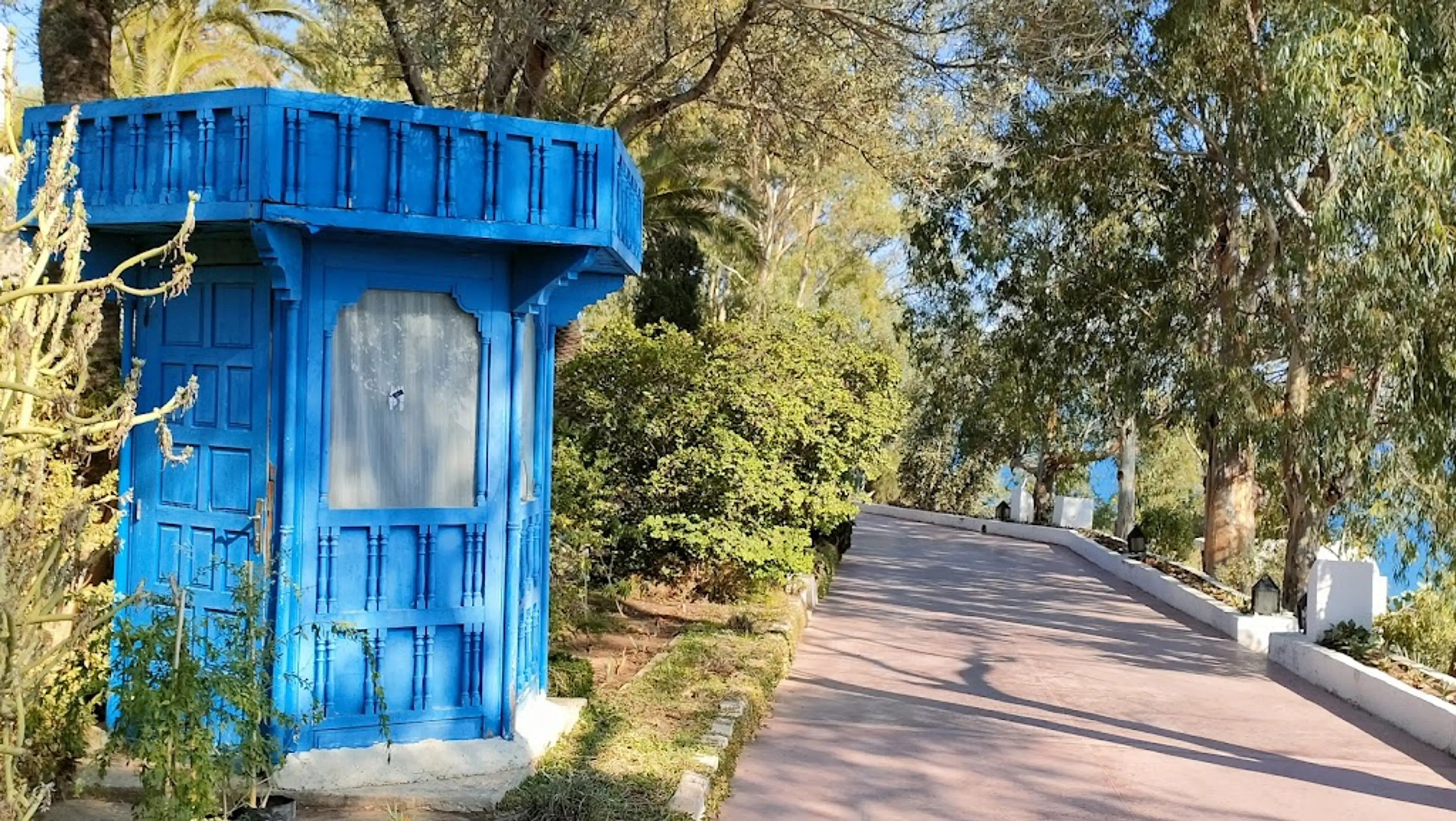
3Ennejma Ezzahra
The former home of Baron Rodolphe d'Erlanger, now a museum showcasing his collection of musical instruments and art.
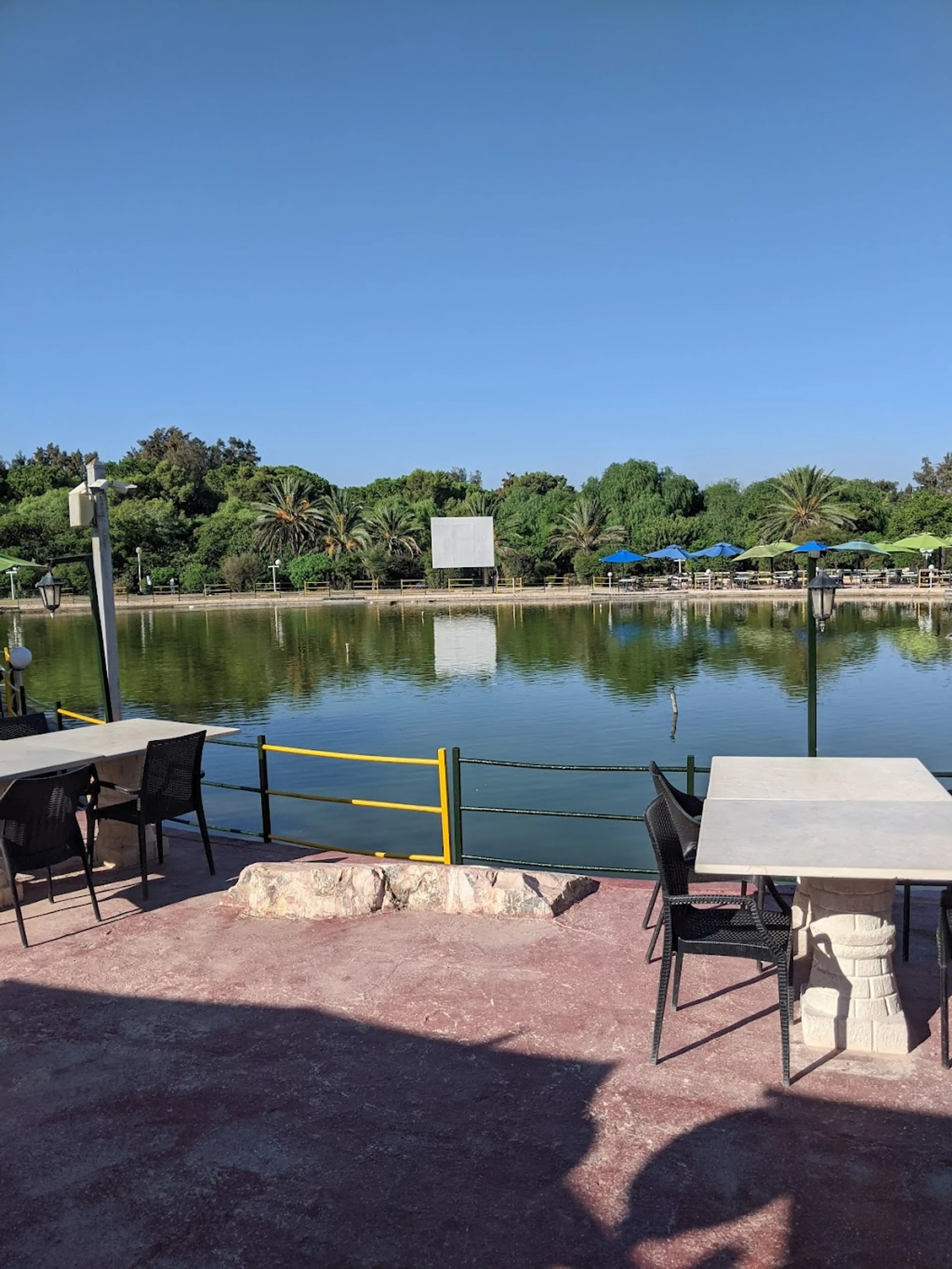
4Sidi Bou Said Park
A beautiful park offering stunning views of the Mediterranean Sea.
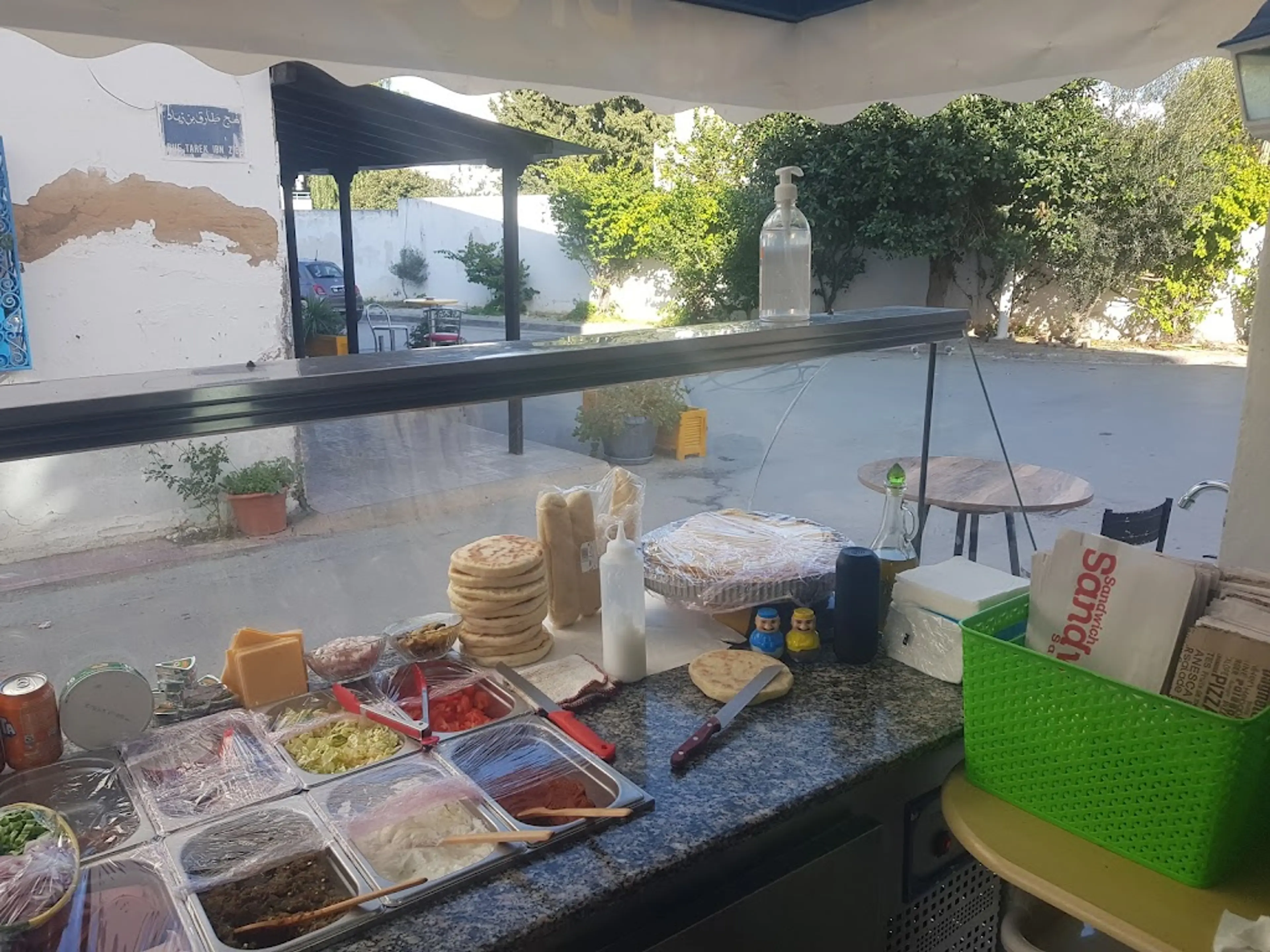
5Local food stall
A place where you can taste authentic Tunisian cuisine, including couscous, brik, and other local delicacies.
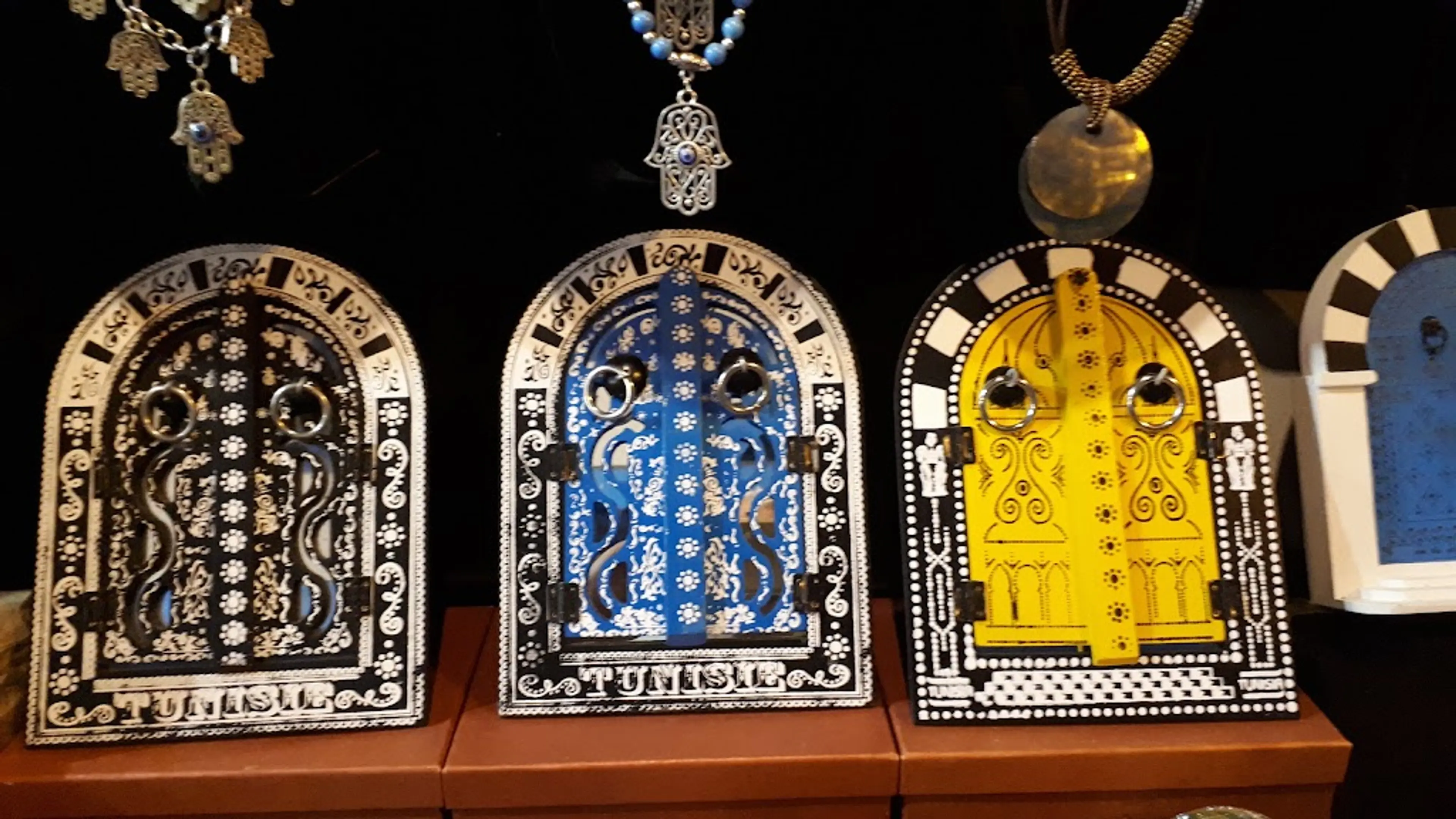
6Traditional Tunisian tea ceremony
A unique cultural experience where you can learn about the traditional way of making and serving Tunisian tea, often accompanied by local sweets.
Local Food and Drinks (12)

Brik
A thin pastry around a filling, often deep-fried. The filling usually consists of tuna, harissa, capers, and egg. It's a popular traditional dish in Sidi Bou Said.

Couscous
A staple food throughout the North African cuisines of Tunisia, Algeria, and Morocco. In Sidi Bou Said, it's often served with vegetables, meat, and sauce.

Lablabi
A soup made from chickpeas and garlic, often eaten for breakfast. It's a common dish in Sidi Bou Said and throughout Tunisia.

Makroudh
A North African sweet pastry that has a diamond shape, the main ingredients are semolina, dates, and honey. It's a popular dessert in Sidi Bou Said.

Chorba
A hearty soup often made with lamb, vegetables, and chickpeas. It's a traditional dish in Sidi Bou Said, especially during Ramadan.

Tajine
A slow-cooked stew made with meat, vegetables, and spices. Despite sharing a name with the Moroccan dish, Tunisian tajine is more like a quiche or Italian frittata.

Harissa
A hot chili pepper paste, the main ingredients are red roasted peppers, serrano peppers, and other hot chili peppers and spices such as garlic paste, coriander seed, or caraway as well as some vegetable or olive oil. It's a common condiment in Sidi Bou Said and throughout Tunisia.

Mint Tea
A traditional Tunisian drink made from green tea and mint leaves. It's often served with pine nuts and is a popular drink in Sidi Bou Said.

Shawarma
A dish in Middle Eastern cuisine consisting of meat cut into thin slices, stacked in a cone-like shape, and roasted on a slowly-turning vertical rotisserie or spit. It's a popular street food in Sidi Bou Said.

Kaak Warka
A Tunisian pastry made with ground almonds, rosewater, and covered with powdered sugar. It's a popular dessert in Sidi Bou Said.
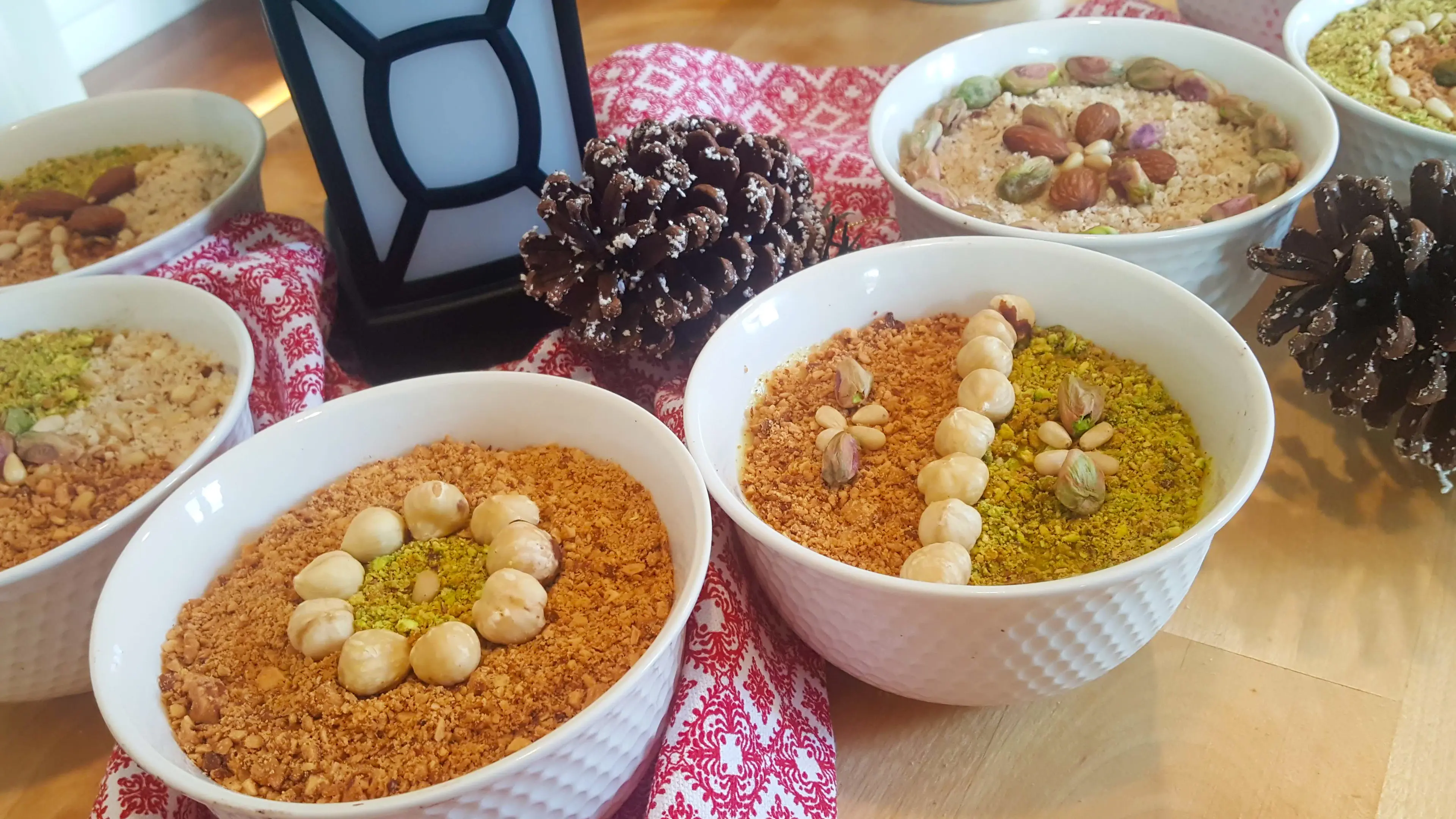
Zgougou
A dessert made from Aleppo pine seeds, milk, and sugar. It's traditionally eaten during the Mouled festival in Sidi Bou Said.
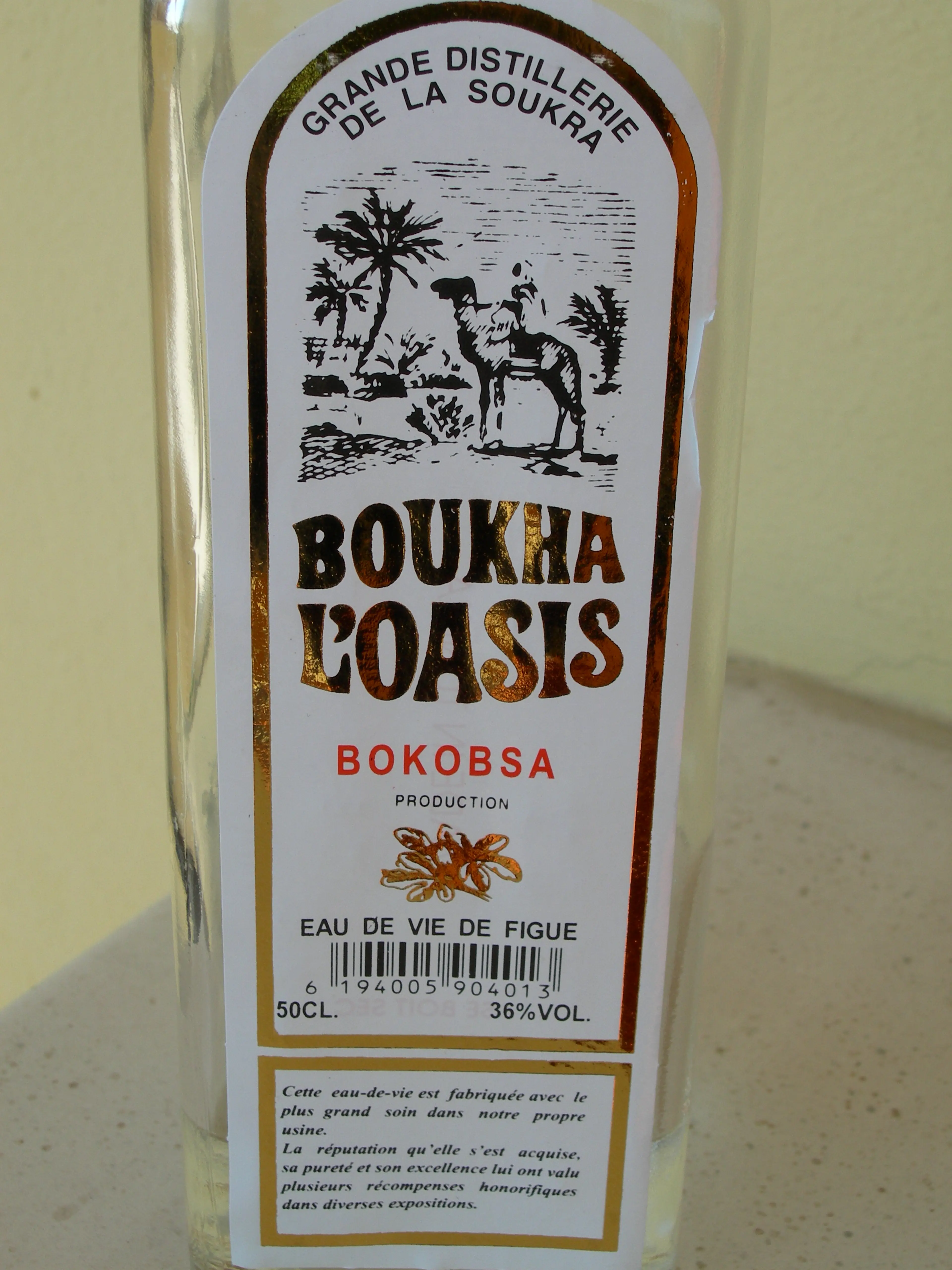
Boukha
A distilled beverage produced from figs. It's a traditional Tunisian drink and is often enjoyed in Sidi Bou Said.
Best time to visit
The best time to visit Sidi Bou Said, Tunisia, is during the spring months from April to June, or during the fall from September to November. During these periods, the weather is pleasantly warm, perfect for exploring the beautiful blue and white village, its beaches, and historical sites. The summer months (July and August) can also be an option if you don't mind the heat, as this is when the town is most vibrant and lively. However, it's worth noting that it can get quite crowded with tourists during this time.
How to get around
Foot
Sidi Bou Said is a small town and can be easily explored on foot. The town is known for its blue and white architecture, and walking around allows you to take in the beautiful views and explore the narrow, winding streets at your own pace.
Taxi
Taxis are a common way to get around in Sidi Bou Said. They are readily available and can take you to different parts of the town as well as to nearby areas. Always make sure to negotiate the fare before starting the journey.
Train
The TGM train line connects Sidi Bou Said with Tunis, the capital of Tunisia. The train station is located near the town center, making it a convenient option for those planning to visit other parts of the country.
Car Rental
Renting a car can be a good option if you plan to explore areas outside Sidi Bou Said. However, parking can be challenging in the narrow streets of the town, and the local driving style may be different from what you're used to.
Ridesharing
Ridesharing services like Uber are available in Sidi Bou Said and can be a convenient and cost-effective way to get around. However, availability may vary, especially during peak tourist season.
Bus
There are local buses that run through Sidi Bou Said, connecting it with nearby towns and cities. The bus station is located near the town center. Buses can be crowded, but they offer a cheap and authentic way to travel.
Bicycle Rental
Renting a bicycle can be a fun way to explore Sidi Bou Said. There are several rental shops in the town. However, the hilly terrain and narrow streets may make cycling challenging for some.
Private Transfer
For a more comfortable and hassle-free travel experience, you can book a private transfer. This can be particularly useful if you're traveling with a lot of luggage or in a large group.
Important information
Currencyد.ت. TND
Time zoneUTC+1
Driving sideRight
Emergency phoneAmbulance: 190; Fire: 198; Police: 197
Drinking waterOpt for bottled water
Power sockets
Voltage230 V
Things to know about Sidi Bou Said, Tunisia as a first time visitor
1
Sidi Bou Said is a small town located about 20 kilometers from the capital, Tunis.
2
The official language is Arabic, but French is also widely spoken due to Tunisia's history as a French protectorate.
3
The local currency is the Tunisian Dinar (TND). Credit cards are accepted in most places, but it's good to have some cash for smaller establishments.
4
Sidi Bou Said is known for its distinctive blue and white architecture, inspired by Andalusian influences.
5
The town is situated on a cliff overlooking the Mediterranean Sea, offering stunning views.
6
The climate is Mediterranean, with hot, dry summers and mild, wet winters. Average summer temperatures range from 70-95°F (21-35°C), while winter temperatures range from 45-60°F (7-15°C).
7
Tunisian cuisine is a blend of Mediterranean and desert dwellers' culinary traditions. Be sure to try local dishes like couscous, brik (a kind of pastry), and Tunisian salad.
8
It's customary to haggle in markets and shops. Start by offering half the asking price and negotiate from there.
9
Tunisians are generally friendly and hospitable. It's common to greet people with a handshake.
10
The town is quite safe, but like any tourist destination, it's wise to be aware of your surroundings and keep an eye on your belongings.
11
Public transportation is available and reliable. The TGM train connects Sidi Bou Said with Tunis.
12
Taxis are also a common mode of transportation. Be sure to agree on a fare before starting your journey.
13
The dress code is fairly liberal in Sidi Bou Said, but it's respectful to avoid revealing clothing.
14
Tunisia operates on Central European Time (CET), which is 1 hour ahead of Greenwich Mean Time (GMT+1).
15
The electrical standard is 220V. The plug type is Europlug (Type C and E). You may need a converter if your devices use a different standard.
16
Tap water is generally safe to drink, but bottled water is recommended for those with sensitive stomachs.
17
Healthcare facilities are available in larger cities, but it's recommended to have travel insurance that covers medical expenses.
18
Tunisia is a Muslim country, so it's important to respect local customs and religious practices.
19
Alcohol is available in most restaurants and bars, but public drunkenness is frowned upon.
20
The town is pedestrian-friendly, and exploring on foot is a great way to soak in the local culture and scenery.
Basic Arabic to know as a first time visitor
English phrase | Native phrase | Pronunciation | When to use it |
|---|---|---|---|
Hello | مرحبا | Marhaban | Greeting someone |
Goodbye | مع السلامة | Ma'a as-salama | Leaving or saying goodbye |
Please | من فضلك | Min fadlak | Making a request |
Thank you | شكرا | Shukran | Expressing gratitude |
Yes | نعم | Naam | Agreeing or confirming |
No | لا | La | Disagreeing or denying |
Excuse me | عفوا | Afuwan | Getting attention or apologizing |
I'm sorry | أنا آسف | Ana asif | Apologizing |
Do you speak English? | هل تتكلم الإنجليزية؟ | Hal tatakallam al-ingliziya? | Asking if someone speaks English |
I don't understand | أنا لا أفهم | Ana la afham | When you don't understand what's being said |
Where is...? | أين هو...؟ | Ayna hu...? | Asking for directions |
Bathroom | الحمام | Al-hammam | Looking for the bathroom |
Help | مساعدة | Musa'ada | In case of emergency |
Food | طعام | Ta'am | Looking for a place to eat |
Water | ماء | Ma | Asking for water |
How much does it cost? | بكم هذا؟ | Bikam hadha? | Asking the price of something |
I would like... | أود... | Urid... | Making a request |
Hotel | فندق | Fanduq | Looking for a place to stay |
Taxi | تاكسي | Taksi | Looking for transportation |
Beautiful | جميل | Jameel | Complimenting something or someone |
Packing List
Clothing
Lightweight clothing
Underwear
Socks
Comfortable walking shoes
Swimwear
Sunglasses
Hat for sun protection
Light jacket or sweater for cooler evenings
Toiletries
Travel-size shampoo
Travel-size conditioner
Travel-size body wash
Toothbrush
Toothpaste
Deodorant
Razor
Shaving cream
Sunscreen
Lip balm with SPF
Personal hygiene items
Travel documents and essentials
Passport
Driver's license or ID card
Credit and debit cards
Cash in local currency
Travel insurance documents
Hotel and transportation reservation confirmations
Emergency contacts and important addresses
Electronics and gadgets
Smartphone
Charger for smartphone
Headphones
Camera
Charger for camera
Universal travel adapter
Portable power bank
Miscellaneous items
Travel guidebook for Tunisia
Map of Sidi Bou Said
Snacks for the journey
Reusable water bottle
Travel pillow
Earplugs
Eye mask
First-aid kit
Travel-size laundry detergent
Weather Conditions
Sidi Bou Said, Tunisia, is a beautiful coastal town known for its blue and white architecture. The weather here is typically Mediterranean, with hot, dry summers and mild, wet winters. If you're planning a trip to Sidi Bou Said, it's important to consider the weather. The summer months, from June to September, are the hottest with temperatures often reaching up to 86°F (30°C). If you're not a fan of the heat, it might be best to avoid these months. However, if you love the sun and the sea, this is the perfect time to visit. Just remember to pack light clothing, a hat, and plenty of sunscreens. The winter months, from December to February, are much cooler with temperatures ranging from 50°F to 60°F (10°C to 15°C). This is also when Sidi Bou Said receives most of its rainfall. If you're planning a winter visit, be sure to pack a raincoat or umbrella. Despite the rain, this can be a great time to visit if you prefer cooler temperatures and fewer crowds. The spring and autumn months offer a happy medium, with temperatures typically ranging from 60°F to 75°F (15°C to 24°C). These seasons provide a comfortable climate for exploring the town's winding streets and beautiful gardens. Regardless of when you visit, it's always a good idea to check the local weather forecast before your trip. This will help you pack appropriately and plan your activities. Enjoy your trip to Sidi Bou Said!
| Month | Hi / Lo (°C) | Weather Overview |
|---|---|---|
January | 16° / 8° | January is the coldest month in Sidi Bou Said, with occasional rain, so pack some warm clothes and a raincoat. |
February | 17° / 9° | February is still a bit chilly with some rainy days, but the weather starts to warm up towards the end of the month. |
March | 18° / 10° | March sees a rise in temperature, but it's still cool enough for comfortable sightseeing. |
April | 21° / 13° | April is a pleasant month with moderate temperatures, perfect for outdoor activities and exploring the city. |
May | 24° / 16° | May is warm and sunny, with very little rain, making it a great time for beach activities. |
June | 28° / 20° | June marks the beginning of summer with hot days, so don't forget your sunscreen and hat. |
July | 31° / 23° | July is the hottest month in Sidi Bou Said, with long, sunny days, perfect for enjoying the beaches. |
August | 32° / 24° | August is equally hot with almost no rain, so it's another great month for beach lovers. |
September | 29° / 21° | September sees a slight drop in temperature, but it's still warm enough for swimming and sunbathing. |
October | 26° / 18° | October is a comfortable month with moderate temperatures, ideal for sightseeing and exploring the local culture. |
November | 22° / 14° | November is a bit cooler, but still pleasant for outdoor activities and exploring the city. |
December | 18° / 10° | December is a cool month with occasional rain, so pack some warm clothes and a raincoat. |
Did you know?
Places near by Sidi Bou Said, Tunisia

Carthage
Ancient city with rich history and archaeological sites

Bardo National Museum
One of the most important museums in the Mediterranean region and the second museum of the African continent

Medina of Tunis
Historic heart of Tunis, filled with narrow streets, monuments, and traditional shops

Zitouna Mosque
The oldest in the Capital of Tunisia and covers an area of 5,000 square meters with nine entrances

Amphitheatre of El Jem
One of the biggest amphitheatres in the world, a UNESCO World Heritage site

Monastir Ribat
One of the oldest and most important defensive fortresses along the North African coastline

Great Mosque of Kairouan
One of the most important mosques in Tunisia, founded by the Arab general Uqba ibn Nafi in 670

Dougga
Well preserved Roman site in Tunisia, UNESCO World Heritage site

Sousse Archaeological Museum
Museum housing a large collection of mosaics, statues and other artifacts from the region

Djerba
An island known for its beautiful beaches and stunning scenery